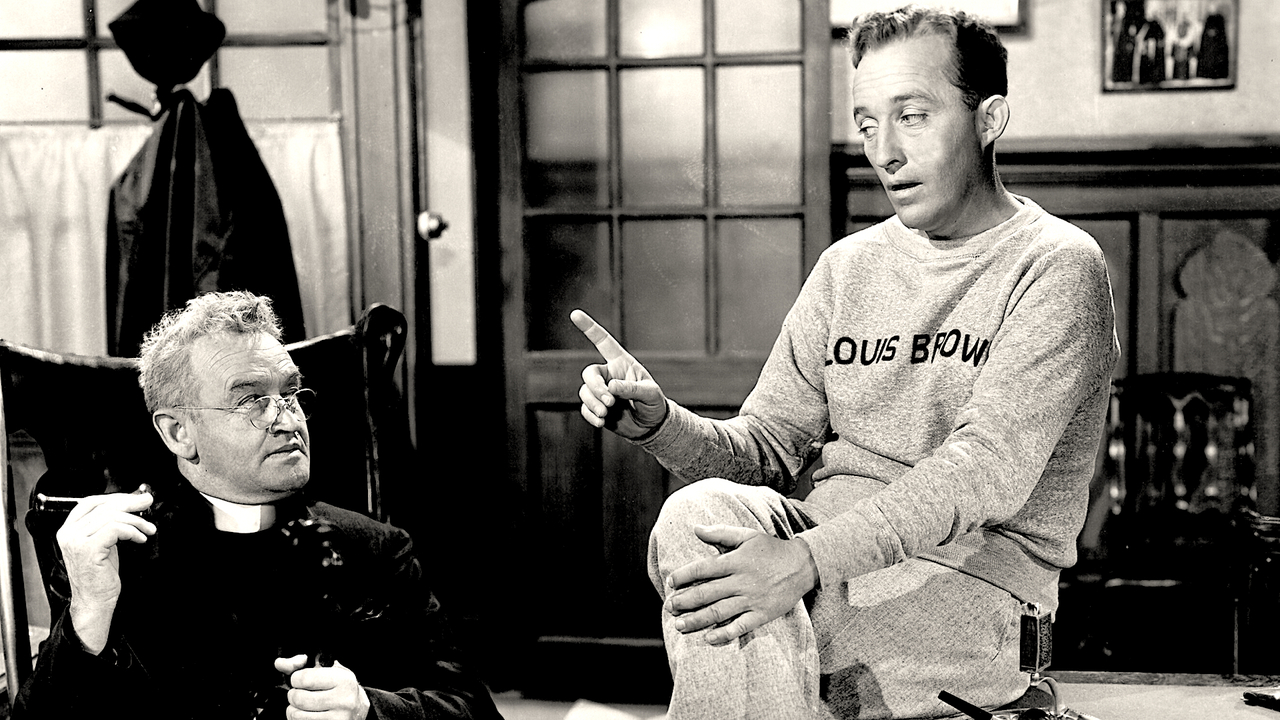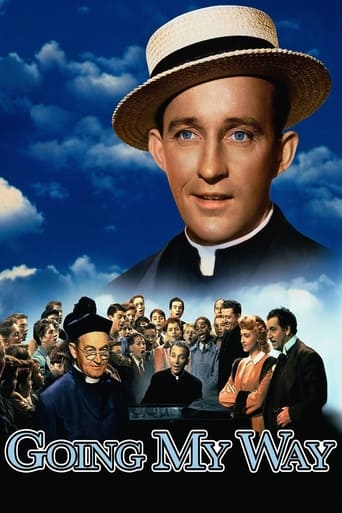

The film is not what I expected. It's very slow in spots, but that is not a criticism...the slowness allows us to absorb the characters and their situations. Crosby and Fitzgerald are truly excellent playing off each other in scenes and it's no wonder Paramount teamed them later in two other unrelated stories. I can also see why Fitzgerald was nominated as supporting actor and best actor, because he's a co-lead with Crosby and he's not really supporting Crosby in this story. In the reviews I have read, I've never seen anyone call this a religious musical but that's definitely what I would label it. It has more music than the sequel, and sometimes the plot comes to a halt so we can hear characters sing (not just Crosby other ones too, like the woman who gets her own scene performing from Bizet's 'Carmen'). It lends to the overall entertainment value, but it does take us away from the main story line, which is what's happening at the church. The last section choked me up more than I expected it would, where they bring the old Irish woman in to be reunited with her son. Leo McCarey and his cast were pouring it on, but it works-- because we see how one man (Father O'Malley) helped change all their lives in a very short amount of time. The choir boys, who seemed derivative of the Dead End kids; the elder priest; the priest at the nearby parish; the young girl and her new husband and father-in-law; the opera singer; and O'Malley himself-- they're all part of a kaleidoscope of faith.
... View MoreFather O'Malley (Bing Crosby) has been assigned to take charge of struggling church, Saint Dominic's. He's taking over for kindly old Father Flitzgibbon (Barry Fitzgerald), but doesn't want the elder priest to know it just yet. O'Malley's fresh approach and youthful appeal help get the troubled neighborhood kids involved in the choir and solve the church's financial troubles.Charming, sentimental tale that won a total of seven Oscars, including two for writer-director Leo McCarey. Bing Crosby and Barry Fitzgerald took home statues, as well. They're both perfect in this. Bing sings a few songs, including "Swinging on a Star" and "Too-Ra-Loo-Ra-Loo-Ral." Good support from Risë Stevens, Stanley Clements, Frank McHugh, Jean Heather, Eily Malyon, and Gene Lockhart. Carl 'Alfalfa' Switzer also has an amusing role.Cynics and anti-religious types will surely hate it and mock it. Their loss. This is a delightful, sincere classic with heart and humor. The story is simple but effectively told. It's the kind of movie that puts a big smile on my face and leaves me with the warm fuzzies. Love that ending! It's followed by a wonderful sequel, The Bells of St. Mary's, as well as many big and small screen imitators over the years. Open your hearts and minds and give it a shot. Leave the pessimism at the door, though.
... View MoreOne reviewer has said "Going My Way" was filmed after the "better" Bells of St. Mary..which had the wonderful Ingrid Bergman playing opposite Father O'Malley..In fact although this was written after "Bells" it was actually Going My Way that was filmed first by Paramount while Bells was filmed a year later by RKO..That being said,who can ever forget this film once you've seen it? The inner city was never more realistically portrayed by any studio. The charm of Bing Crosby as the young priest did deserve the Oscar and Barry Fitzgerald's performance as the along-in-years priest is mesmerizing.This movie is heart-warming and brilliantly staged. There are so many supporting cast members that are spot on, they are everywhere from the streets to the the Metropolitan Opera. A true classic. Watch and enjoy this gem.
... View MoreFirst of all, to watch this movie and get anything out of it, one has to set aside the jadedness of 2012, and go back to the perhaps more innocent times of 1944. Yes, World War II was raging, but society was different, and this movie was a product of that society. It's a simple, rather hopeful movie, filled with basically decent characters who perhaps have to have their hearts and souls stirred to connect with that decency. It's up to Father O'Malley (Bing Crosby) to find that innate decency in all of them and to bring it out.Essentially the movie revolves around the sometimes tense relationship between O'Malley and Father Fitzgibbon (Barry Fitzgerald.) Fitzgibbon has been the parish priest of St. Dominic's for 45 years, and now things aren't going well. The church is in financial trouble and is in danger of defaulting on its mortgage. The bishop sends O'Malley in to take charge - but without upsetting Fitzgibbon by telling him that O'Malley is in charge - a rather delicate balancing act. Along the way, O'Malley deals with the church busybody, a gang of street boys, a wayward young woman and the holder of the mortgage, and he reconnects with some old friends along the way.There was maybe a little bit too much going on. I realize that in all of these interactions the theme of O'Malley helping the various characters turn their lives around and develop heart and soul is present - perhaps, though, we didn't need so many story lines to keep hammering the theme away at us. Yes, I know I argued that we have to let go of jadedness, but this does seem somewhat unbelievable. For example, I doubt that - even in 1944 (except in Hollywood) - it would have been so easy to turn a boys' street gang into a church choir! Having said that, it's a nice movie to watch.It's most famous I suppose for its 10 Oscar nominations (and 7 wins - including Best Picture.) I honestly don't see it as being that good. In fact, I enjoyed it less than its sort of sequel in 1947 - "The Bells of St. Mary's," in which Bing Crosby reprised the role of Father O'Malley. That movie, I thought, was more focused; this one seemed to wander a bit much. It's also noteworthy for 2 of its nominations in particular - Barry Fitzgerald was nominated for both Best Actor (which Crosby won) and Best Supporting Actor (which Fitzgerald took)! That had never happened before and it can never happen again, because the Academy changed the rules afterward to prevent an actor from being nominated for two awards for the same role, so it's a noteworthy bit of background to the movie.I thought the movie was surprisingly (and I'm sure unintentionally) honest in having music producer Max Dolan (played by William Frawley) reject O'Malley's song "Going My Way." As the title song of the movie, I really didn't think it was that good either! The tug at your heartstrings moment at the very end of the movie (which I won't give away) worked surprisingly well. It was emotional - and I didn't see it coming. I like being taken by surprise, so a point for that! If I thought that the movie itself was a bit overrated, I thought that Crosby and Fitzgerald were both quite good in their respective roles. It's a little bit too long (probably because it does seem to lose its essential focus by trying to follow too many of O'Malley's relationships) but it's a pleasant, enjoyable film. (6/10)
... View More